Using the blink-and-you’d-miss-it 7.11 opening of Death Defying Acts as a bellwether and ricocheting off those recent Bob-and Harvey-are-on-the-ropes articles in Business Week and the Hollywood Reporter, the Sunday Telegraph‘s Tom Teodorczuk posted his own assessment yesterday about how the boys seems to be “up against it.” One non-attributable industry guy is heard from, and Teodorczuk speaks to yours truly also (on the record, of course). But mainly it’s a numbers-and-business-moves analysis piece.
Month: July 2008
Montana

Sunday, 7.20.08, 10:05 pm
No Engulfment
For the time being don’t click on this YouTube link. Click instead on this mp3 and try to answer the following: (1) Who’s the actor?, (2) Who/what is he playing?, (3) What TV show is this from?, and (4) What’s The Name of the Episode? Hint: the actor became a hyphenate when he got older.
Quantum of Nothing
This? Where’s the idea, the edge, the special whatever? He’s just standing there with a big weapon. And what’s with the brown hair?

Angels
Four days hence Barack Obama will will give his big Berlin speech in Tiergarten Park (German for “animal garden”), beneath the monument topped with the big golden angel known as the Victory Column. Some say the site has an unpleasant association with military aggression. But for most of us it means Wim Wenders‘ Wings of Desire (’87), and particularly those two middle-aged angels, Bruno Ganz and Otto Sander, standing atop the tower and vibing out. Which, for me, makes it a place of dreams, reflection, longing, compassion.

Fait Accompli
“Given that Heath Ledger‘s Joker performance is worthy of a nod, but hobbled by its generic provenance, what’s the extra magic ingredient that will put Ledger over the top come next February?,” asks the Guardian‘s John Patterson. “Will it be the stark and depressing fact that he’s dead, and thus worthy of posthumous veneration. Or will it have more to do with The Ugly?
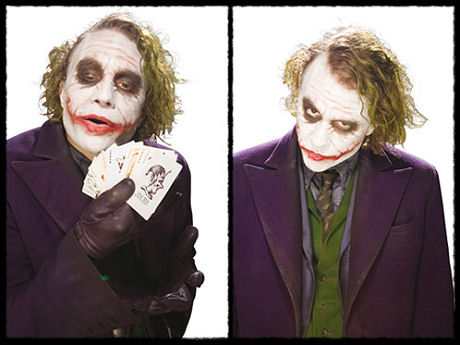
“I’m betting on The Ugly. Death is no way to get Oscars. Back in 1968 there was a furious campaign to prevent the recently deceased Spencer Tracy being nominated as best actor for Guess Who’s Coming To Dinner, on the sound basis that plenty of living actors deserved a break. Only in 1976 was this taboo finally overcome, with the recently deceased Peter Finch‘s victory for Network, but that was the 1970s, when everyone was crazy.
“So, The Ugly. Ledger went all Lon Chaney on his Joker. He worked out the makeup largely on his own, lathering himself up a Catweasel-style hair-catastrophe, and smearing his face with white powder to contrast with his two horribly healed, livid-scarlet cheek-slashes, which resemble what hangs out of the sides of a pastrami sandwich. For anyone who thinks Ledger got too involved in his role, bear in mind that Chaney — champion makeup man — actually pulled his eyeballs from their sockets with wires for his 1926 Phantom Of The Opera. He called it ‘extreme characterisation.’
“Ugly’s quite big this season. Hellboy endures snotty teenagers shouting, ‘Dude, you’re ugly!’ at him in his forthcoming sequel, and the Hulk ain’t no oil painting when his blood’s up. But Ugly isn’t bad for Oscars, or at least for nominations. The Elephant Man, Mask, Monster and The Hours (renowned babe to butt-fugly horror being a favored rite of passage in movie-star self-abasement trajectory) — all those harrowing sojourns in the Ugly Chair, all that falling out of the Ugly Tree and hitting every branch on the way down, it adds up in terms of prestige and awards.
“Beautiful Hollywood always loves an ugly loser. So maybe it’s Heath’s year after all.”
When was the last time that a villain performance was talked about so confidently and so early in the game as an all-but-certain Oscar nominee? Javier Bardem‘s Anton Chigurh in No Country for Old Men, of course. (My bad for spacing.) Before that, Anthony Hopkins in The Silence of the Lambs.
Re-Think
An interesting Newsweek piece by Fareed Zakaria (dated 7.19) that carefully explains how the rap on Barack Obama (i.e., softheaded idealist who thinks that he can charm America’s enemies) is off the mark, and that his world view “is far from that of a typical liberal, [and] much closer to that of a traditional realist.” From an historical perspective, at least, Zakaria claims that Obama seems more “the cool conservative” — particularly given his reported admiration for the dispassionate foreign policy moves of the first Bush administration — “and McCain the exuberant idealist.”
Pineapple Hedge
“Putting a violent spin on the Superbad formula (envelope-pushing raunch plus unexpectedly sweet affirmations of male friendship), Pineapple Express emerges as a fitfully funny, tonally trippy but not entirely satisfying effort from the Judd Apatow comic fraternity,” writes Variety‘s Justin Chang in a review that went up last night. Chang is obviously hedging, fence-straddling, not sold. Is this an omen of reactions to come, or is Chang just some fickle Variety guy off on his own beam?

“Featuring Seth Rogen and a scene-stealing James Franco as two pot-addled losers on the run from a ruthless dealer, director David Gordon Green‘s first mainstream venture is an unruly, literally half-baked hybrid of bloody hijinks and stoner laughs.
“This is certainly one of the better-looking efforts to come off the Apatow assembly line, composed in crisp widescreen images by d.p. Tim Orr, whose poetic lensing in Green’s previous films helped earn the director comparisons to Terrence Malick. But production values are somewhat beside the point when the movie in question is more Harold & Kumar than Badlands.”
Interesting observation: “In addition to its many nasty instances of stabbing, shooting, groin-kicking and head-smashing, the pic offers perhaps the most graphic case of ear mutilation since Reservoir Dogs. [But] beyond that, neither the comedy nor the carnage warrant further Quentin Tarantino comparisons.
“Some choice lines aside, too much of the humor is predicated on the notion that watching others get high is inherently funny (unless the viewer happens to be in a similar state, it’s not). And while its genre-blurring may seem audacious by studio standards, in the end, Pineapple Express still feels too safe, too constrained by buddy-comedy uplift, to have any real bite. Ironically, the stakes seemed higher, the test of the central duo’s bond more wrenching, in the far less eventful Superbad.
“At the same time, the pic’s feel-good aura is undeniably part of its appeal, rooted in the chemistry of its two leads. As the more rational, stressed-out Dale, Rogen makes a perfectly panicky foil to Franco, who delivers a hugely likable turn as a genial bum who’s lonely at heart and loyal to the core. McBride also scores laughs as the corruptible but surprisingly resilient Red.”
Sunday Numbers
The Dark Knight will do about $151.7 million by tonight. (Maybe more than that as the N.Y. Times is reporting $155 million and change.) It made $47 million yesterday, and about $66 million on Friday (counting Thursday-Friday overnight haul of $18. 5 million). Mamma Mia! did $9.8 million on Saturday, and will end up with about $27.6 million by tonight.
Hancock will make about $14.1 million — now at $191.6 million, sure to pass $200 million. Journey to the Center of the Earth, off 43% from last weekend, will end up with about $12 million. Hellboy II was absolutely killed by The Dark Knight, dropping a whopping 71% from last weekend, and this weekend taking it a lousy $10 million.
WALL*E will earn $9.8 milllon by tonight — it’s now at $182 million, will barely eke out $200 million. The seventh-place Space Chimps will make $7.3 million — disaster.
Mamma Meh
I paid money to see Mamma Mia! at the Grove last night. As the Grove crowd skews younger, it was no surprise that management was showing this hideously spirited goofaholic musical in one of their smallest theatres (and The Dark Knight in four much larger houses). But what a surreal trip this thing is. I started to quietly flip out within minutes. The mood was appropriately “fun” and spritzy and all, but at the same time it felt like bad mescaline. I probably had an “uh-oh” look on my face. Fearful deer eyes, mouth half open.
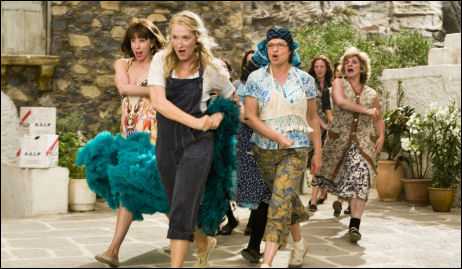
Ultra-bright sunwash sound-stage lighting….
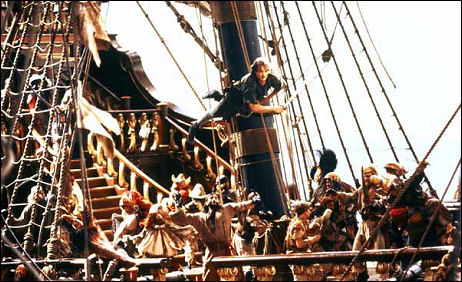
…that I first saw in Steven Spielberg’s Hook
I’m not talking about the bubbly girlie vibe that wears you down like a happy jackhammer. That’s just the director, Phyllida Lloyd, trying to give the film a unified emotional tone. I’m talking about the incompetent look and substandard craft of Mamma Mia!. Top to bottom, this sucker is poorly shot, poorly lit, poorly cut, poorly green-screened. It’s been made for the mostly female “easy lays” (ABBA fans, musical fans, those who’ve seen the stage show) who aren’t looking for much more than tunes and buoyancy and “hah-hah!”
Even if you know nothing about good filmmaking craft, a film that looks as weird as Mamma Mia! creates an “off” atmosphere that is difficult to describe. You have to sit through to really get it, I think. It would lead anyone to ask a series of Hamlet-like questions, I would think. As in “What is this? What’s wrong? Why do I feel so badly? Why does this movie look and feel flagrantly fake?”
The most bothersome thing for me was the fake sunshine lighting, necessitated by Lloyd and her dp, Haris Zambarloukos, deciding to shoot portions of the story, which is set on a small Greek island, on a sound stage at England’s Pinewood Studios.
I hated this indoor hot-sunwash effect when I first saw it 17 years ago in Steven Spielberg‘s Hook, which was shot by Dean Cundey. It looks precisely like what it is — an artificial simulation of sunlight that mandates a sense of profound unreality, and in so doing drives you half mad.
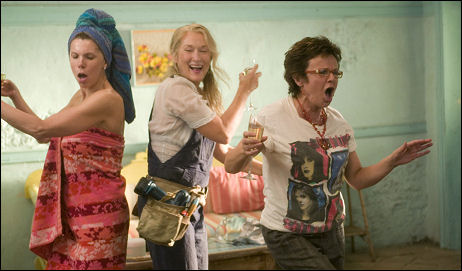
Otherwise I agree that Meryl Streep has given her worst performance ever in this thing. She overdoes the frenetic high spirits, rolling around and mugging and eyelash-batting and shooting her arms and feet out out at every turn. As N.Y. Times critic A.O. Scott said, “There is a degree of fascination in watching an Oscar-winning Yale School of Drama graduate mug and squirm, shimmy and shriek and generally fill every moment with antic, purposeless energy, as if she were hogging the spotlight in an eighth-grade musical.”
And yes, I still blame Osama bin Laden for this.
The crowd I saw it with was laughing, chuckling, into it, having a good old time. They laughed so loudly at times that I actually turned around and glared, partly confused (“what are you laughing at, for heaven’s sake?”) and partly annoyed. Mamma Mia! isn’t for people like me — I get that. I just don’t understand why someone in the chain of command didn’t say, “Why don’t we get someone who really knows from screen musicals to direct this thing?”
Music in Their Heads
It is naturally assumed that the order of quality (i.e., the editorial estimation of same) in Entertainment Weekly‘s 25 Greatest Musicals rundown is indicated by numerical sequence. And so #1 is The Wizard of Oz — agreed, fine with me. And yet the lowest ranking (#25) is given to Once, one of the great genre-redefining musicals of all time? A movie with more straight-from-the-street soul and real-deal emotion in its left earlobe than Chicago (which EW has ranked seventeenth) has in its entire splashy-glitzy body?
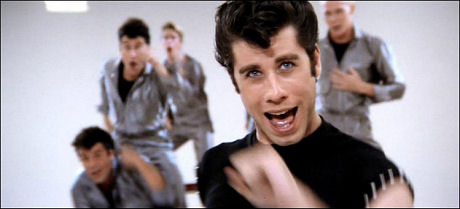
John Travolta in Grease, which (believe it or not) came out 30 years ago.
And Robert Wise ‘s West Side Story (’61), which inexplicably won a Best Picture Oscar for having lacquered, stodgified and suppressed the New York spirit of one of the most electric-profound Broadway stage musicals of all time, ranks as the second greatest? Did the EW editors and writers really hash this list out? Because anyone who says with a straight face that West Side Story is the second greatest musical of all time has a serious internal problem.
Singin’ in The Rain, Cabaret…fine, deserved. Wait, Mary Poppins is ranked fifth? I don’t dislike it as far as Disney musicals go — the bright. slap-happy mood of it, the mix of animation and live action, etc. — but what about the Dick Van Dyke curse (i.e., any film that toplined Van Dyke during his brief star status reign in the mid to late ’60s loses more esteem with each passing decade)? And what about those revoltingly cute kids? It should been ranked…I don’t know, 15th or something.
Grease is ranked fourteenth. I remember vividly how I felt after first seeing it in ’78, coming out into the bright light of West 55th Street and ragging on it with a lady I was seeing at the time. We both felt the insipid gloss and plasticity factor trumped the Travolta-Newton John charisma element. And then it became hugely popular, of course, and then a massively successful Broadway musical, and so EW, obliged to kowtow to the commercially powerful cult of old-school rock nostalgia, has to pay tribute.

Bjork in Lars von Trier’s Dancer in the Dark
Hairspray, which boasts a vaguely similar musical attitude, is right behind Grease at #15. What can anyone who truly loves musicals say? Standards are sinking, cracks are appearing in the foundation beams, the world is slowly going to hell and EW is leading the charge…tah-rah, tah-rah.
EW has further determined that Lars von Trier‘s Dancer in the Dark, easily the equal of Bob Fosse‘s Cabaret in terms of presenting a musical in startling new terms, doesn’t rank at all among their top 25. How very deep of them. Dancer had a story and a scheme that gave a new sense of realism to the idea of breaking into song (i.e., the singing and dancing is happening inside the head of a dreamer who can’t deal with life and is therefore a kind of neurotic escape). And then Von Trier delivered on the escape-from-life idea by dramatizing (and musicalizing) the darkest imaginable result.
[HE reader “btwnproductions” has acccurately pointed out that Herbert Ross‘s Pennies From Heaven used the same idea back in ’81 or thereabouts.]
And speaking of tragic musicals, where is Henry King‘s Carousel? It’s not that great a film — Gordon MacRae‘s performance as Billy Bigelow almost single-handedly sinks it — but the basic idea behind the material (i.e., an attempt by an angry and bitter ghost to express the love and kindness he was unable to summon when mortal) is quite devastating, and the final ten or twelve minutes is an emotional grand slam.
